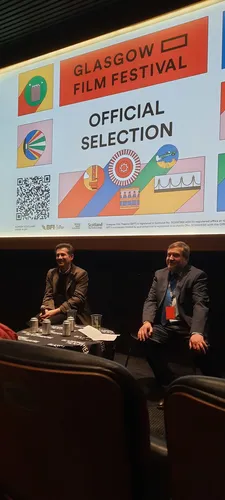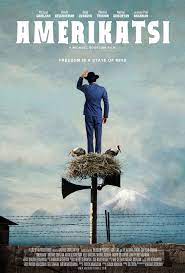 |
| Amerikatski |
Introducing Amerikatski at 2023's Glasgow Film Festival, director/writer/star Michael A Goorjian talked about the struggles and rewards of film-making across Covid restriction. Opening with "I feel like singing," he talked about how "film festivals keep us going" and said that the pleasure of showing films "to an audience [in theatre]" was "why we do it it." Closing his remarks before the film he said that while it had taken over seven months to finish a film whose small scale belies its ambitions, "despite the obstacles [they] did their best to find the opportunities [in all] the challenges."
After the film, in Q&A hosted by festival co-director Allan Hunter, Goorjian explained that in addition to the film being dedicated to his grandfather, parts of the story were inspired by family history. While Amerikatsi's protagonist escapes from the Armenian Genocide, his grandfather had escaped by similar means in 1905, when "earlier things [were] going on." His grandfather had described Michael himself as "a happy guy" and Goorjian felt that maintaining positivity and effectively "emphasis[ing] that side of humanity" was in part a tribute. Hunter fairly characterised the film's protagonist as "guileless," never despairing, and Goorjian agreed with that sentiment.
 |
| Amerikatski director/writer/star Michael A Goorjian with the Glasgow Film Festival's Allan Hunter Photo: Andrew Robertson |
He further explained that a Ukrainian friend had told him a story of a prisoner with a view, a story in which he found "something poetic" and a parallel in that "film is voyeurism". Around that concept, "tone and style" found themselves, assembling around the concept into something that he described as "a fable."
Agreeing again with Hunter's description of it as "dark" but "life-affirming," Goorjian talked about the complex process of filmmaking. Not only working through Armenia's (and global) Covid restrictions, with a multi-national cast, but threading the needle of its deliberately difficult plot. It was shot in 2020, managing about ten days into the pandemic before members of the cast had to return to Spain, Moscow, and elsewhere. Goorjian himself remained in Armenia, talking about how in shooting it, and "even in editing," there was "no idea" if it was going to work. He talked about how it was easier to do something quite 'gritty' - "it's a style of its own" - and that he "didn't know if it would work." He can rest assured that it does. While admitting himself that "music and score helped a lot," I must admit I think he overplays the role of accident. While it's perhaps one of the secret currencies of film, it's clear his efforts to avoid archness, not being "too aware of what you're trying to do," and creating space for opportunity, paid off. "Good things come" from taking risks, and it seems very much the case here, both within the film and behind the scenes.
A question about filmic inspirations included I think a mention of director (Emir) Kusturica. He also mentioned Life Is Beautiful, Rear Window, and The Lives Of Others. He said that the latter was what he was "most influenced by, in terms of relationship." While some "core human things [are] negative, some [are] very positive," including that we "want to help others."
He talked about how he started directing because he loves acting. Confessing to an ignorance of more technical aspects, he said he "[doesn't] know what lens does what," but it's clear that he can form good working partnerships, he "trusted [his] cinematographer" (Ghasem Ebrahimian), and not unfairly given Ebrahimian's decades of experience, and formed a good relationship with his camera operator.
Asked about the music, he talked about "three layers" to the score. There was "folk music mostly created by Mikial Voskosian," who is a tar player. Serj Tankian from heavy metal act System of A Down, who has Armenian heritage himself, helped find musicians, as well as serving as a producer. There was archive music from the Soviet States, locally produced pro-Stalin propaganda, some of which can be heard in the roughly contemporary, differently fictive Death Of Stalin and State Funeral. There were actual recordings from the Forties and Fifties. Finally the score itself by Andranik Berberyan, who has provided music for several features and shorts. He talked about budgetary constraints, but also how he was helped by recognition that this was a project with national ambitions. "As a good Armenian [Goorjian was] trying to share culture and history [by] tell[ing] a story that was relatable." The aim was to give a picture of a place more complex than "Kim Kardashian, genocide, gold chains down Ventura Boulevard." To that end, Armenia's National Philharmonic volunteered to provide what would be their first film score, for free. They "got the idea [Goorjian and his team were] trying to make something... anyone can relate to," to know "who Armenians are."
That national identify included the presence of storks. Explaining that they're symbolic of the diaspora and found all over Armenia, Goorjian further explained that the song Gorani, which plays an important role in the film, is itself about cranes/storks. Their presence in the film is often assisted with special effects. A more practical equivalent in terms of costuming was managed by sourcing a lot of things from Ukraine and Poland. The film's costume designer Maro Parian was described as "from LA" but now in Armenia, and her efforts help establish the setting. I had asked a question about sets, as many of the locations are similarly authentic. Goorjian told a story about how some of them were used in multiple ways, including a very funny story about constraints on filming whose full details may have to wait until I have determined what the statute of limitations is for what might be an immigration or quarantine offence. Suffice to say that checking up on someone by video-call when they have (or don't have) a film crew with them may be more efficient than it is accurate.
 |
| Amerikatski poster |
Misplaced bureaucratic confidence is important to the film. Talking about the repatriation that informs Amerikatsi, he discussed the various waves of return. "Back then people didn't know" how bad things were behind the Iron Curtain, how the promises were and would be unfulfilled. "Being from the diaspora side, Charlie's story is one part of the film," a story which evolved during shooting. He's not the only person affected by circumstance, talking about the experience of those involved with the Armenian Soviet State. "Stripped of their identity," "no longer Armenian [but instead] a Soviet citizen." That theirs was "another experience," that the travails of those who stayed were not necessarily understood by the diaspora. As part of his aim, that he was "trying to represent that to a degree." That ambition would seem to have been one of the things that secured so much co-operation within Armenia.
Shown at Glasgow's 2023 festival, it had its première at Armenia's Golden Apricot festival, where it was screened at the Opera House. He described the experience as "pretty crazy." He talked about how "Armenians tend to be more critical than non-Armenians." Beyond trying to help younger audiences reconcile with some of the darker and also more comic elements, he explained that a lot of the stuff is based in truth, the "absurdity" of what took place. That things like this really happened is difficult enough, but apparently one audience member was most concerned that the refrigerator was the wrong one. That sort of small detail can for certain audiences break suspension of disbelief, but even having been told that, Amerikatsi still hangs together, and well.





















